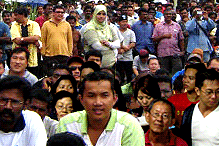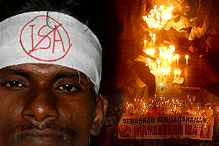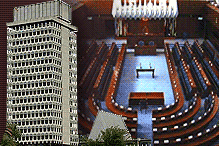When Alan Paton wrote ‘Cry The Beloved Country’ he was lamenting over the inhumanity of man over man, of how the whites can devise, construct and implement race- and colour-based social and economic injustices over the blacks in apartheid-era South Africa.
The whole world had condemned this practice; we were among the loudest screaming against it.
South Africa has moved on since then, and today it is one shining example of an emancipated, open and progressive country, enjoying a respectable place in the community of nations. It has thrown apartheid into the bins of its history.
 Here in Malaysia, yes we condemn apartheid, and quite rightly so. But in the same breath we were and are still its major proponent our version of apartheid.
Here in Malaysia, yes we condemn apartheid, and quite rightly so. But in the same breath we were and are still its major proponent our version of apartheid.
We do not call it apartheid; of course not. We call it instead ‘Ketuanan Melayu’ under the guise of ‘championing Malay rights,’ and implementing it under the New Economic Policy. It’s smart, right? In none of them does the word ‘apartheid’ appear!
Yes, we are smart. We do not blatantly call it apartheid, we merely perfected the process of social separation. First of all we ensure the great majority of civil servants, the police, and the military are manned by Malays (the target benefactors). We give them good salaries, good perks and assured employment. We then devise rules and regulations, and even laws, to ensure the NEP’s easy implementation.
We then brainwash our Malay brethren with the notion ‘untuk agama bangsa dan negara’ that there is a higher ideal beyond performing a duty with professionalism and dedication, and that is doing things in the name of religion and race.
We devise rules and regulations, and even laws, to ensure the NEP’s easy implementation.
Then we design and implement social and economic policies like channeling lucrative government contracts, separate education streams, housing rebates, banking and financial support, in favour of, you guessed it, the Malays.
It does not stop there. We devise measures to prevent the people from raising too much objections to all these by introducing or continuing legislation and religiously implementing them.
The Sedition Act for example stops people from talking too much about language and religion. The Official Secrets Act prevents people from gaining access to government files.
Students and lecturers are not allowed to discuss and make public any subject that would appear to be critical to government (yes, government, not political) policies and philosophies.
All publications must, first of all, get operating licences. Newspapers must not only get a licence before publishing but it must be renewed every year.
Sacrifices conveniently forgotten
 The king of all of the suppressive and oppressive laws is the Internal Security Act, when a citizen can be put under detention without the benefit of any charge!
The king of all of the suppressive and oppressive laws is the Internal Security Act, when a citizen can be put under detention without the benefit of any charge!
All said and done, we sacrifice the rule of law in favour of rule by private individuals. To show that we are really smart, we pooh pooh the loyalty and patriotism of the non-Malay segment of the population.
We call them pendatang or immigrants bearing the stigma that they are social discard from their original country, similar to rogues, rascals, refugees, mercenaries and scoundrels. We just ignore their proven talent and ability in wealth creation and economic productivity, as well as to their demonstrated loyalty and patriotism.
Many of such pendatangs have made the ultimate sacrifices as military personnel defending its security, during the Emergency, the Confrontation period with Indonesia and as policemen while policing the social environment.
They have contributed and are continuing to, in sport and the arts. Their record as loyal and patriotic Malaysians is quite impeccable. But we do not really care.
The perplexing thing is that despite these attributes and positive records of the non-Malays, we are still going about championing and implement apartheid principles. In this new year, perhaps we can do with a little reflection: why are we doing all this?
We do this apparently to recover our lost soul. We perceive that we have been victims of colonisation when the Portuguese, Dutch and British colonisers all but butchered the Malay entity, psychology and culture. In the process we perceive that we have lost our Malay identity.
With independence, we thought we could recapture the lost glory of Malay suzerainty by
becoming masters of all facets of a nation, especially its commerce, and economy. We found out that the Chinese community had beaten us to it.
We felt the Chinese had capitalised on our weakness and captured the economic initiatives (and wealth) as well as the social characteristics of the country. We lost ‘face’.
Now we want to regain the mertabat or dignity and pride of the Malay race!
Yes, we feel that we have to recover our soul and it is here that we are reminded of Paton’s book title, but in this case suitably paraphrased to – cry my beloved Malay soul.
Our Malay soul needs to cry for doing the right thing for the wrong reason or the wrong thing for the right reason; even for the wrong thing for the wrong reason, but not for the right thing for the right reason.
To start with colonisation is really not an excuse for our psychological malaise and ineptitude.
Colonisation has been a feature of human history and felt all over the world. There are very few countries that have not been colonised in the world.
It is thus a neutral concept in human social and economic development. It is certainly not an impediment to social or economic progress as we are wont to portray it. We should dump this notion that we hold dear into the bin of history.
Rethinking our way of thinking
Just look at the records. The Koreans were once colonised by the Japanese, but today Korea is an industrial power house. Singapore was once colonised by the British and was indeed a part of us, and today we see this tiny country being a solid financial, trading and industrial entity.
Most pointedly of all, the US was once a British colony and today it is the mightiest nation in the world. Our second grouse - that the Chinese have cornered the economic sector of the country also needs re-looking into, on two counts.
First, the Chinese did not become successful based on any conscious and concerted economic programme to economically marginalise us.
We did this self-inflicted wound ourselves. As proof, we have to note that most of the Chinese came to our shores with only their feet, hands, guts and brains and perhaps a bundle of clothes, nothing more.
They become successful for their hard work, both physically and mentally and for the sacrifices they were prepared to make and had undertaken. They were successful for having the mental fortitude to seek opportunities, grab those that come along and worked extra hard to realise the potentials of these opportunities.
Secondly, we have been given a chance to be equal with them, both under numerous 'special privileges' enshrined in the Constitution, as well as under its NEP implementation programme.
 The special privileges have always been in the constitution while the latter began in 1970. In short, we have been given the chance - the opportunity - many times over, to better our Malay polity.
The special privileges have always been in the constitution while the latter began in 1970. In short, we have been given the chance - the opportunity - many times over, to better our Malay polity.
Whereas the Chinese had to struggle just to find and identify the opportunities, in our case they were handed to us on a silver platter!
Thus far we have failed to capitalise adequately on them. It rather shameful we missing out on these chances specially created for us in the first place.
Either way the root cause of our weaknesses and the strength of the Chinese lies in two words - positive thinking. Our thinking is mired with so many dos and don’ts, so many musts and musn’ts, so many cans and cannots, may and may nots, plenty enough to created and internalise doubts and fears in our minds.
So much so that we have doubt over what we can and what we can’t do, what is allowed and what is not. We spend a lifetime looking for these highly complex cans and cannots, musts and must nots, that we have hardly any mental energy left to develop and self-confidence to get on and face the realities of life.
Let’s refer to this case as the ‘can’t don’t and won’t syndrome’. The Chinese by the way are not encumbered by such syndromes.
What appears to have happened is that this syndrome has affected our mental ability to conceptualise. We see things on the straight and narrow. We accept wisdoms handed down to us by our elders as the gospel truth.
Blinded by sentiment
We do not see that things can be seen and interpreted in many alternative ways. We feel we have the monopoly on truth; we therefore think that we are right all the time and other people are wrong all the time. Witness the way we see religion for example.
We think that we as Muslims are right and other people who profess other religions are wrong, all the time.
We need to cry for thinking that we can and have doctored the way the people think and do things. We have been intimidating the people with what they can read or write or think and do.
We seem to be saying "you can think anything, do anything, write anything so long as it does not criticise or condemn the government".
Soul-searching and resuscitating is not or should not be about pointing accusing fingers at some bogeys. That would be a most negative thing to do. It would be better for us to be open-minded and be able to identify our own strengths and weaknesses.
We improve upon our strengths and dump our weaknesses. Mainly we must be able to develop the awareness that we have both the strengths and weaknesses in the first place.
To illustrate, the NEP has proved many time over as a failed strategy for our socio-economic advancement. Let us be aware of this in the first place and move on seeking other ways with better chance of success.
How about secularising the Malay mind? It might make for a good start for we can see many of the don’ts, can’ts, musn’ts dissipating into the wind.
In the meantime, here we are in the early days of a new year. We should begin by realising that whatever 'smart’ moves we had undertaken all this while have not really been that smart after all.
The joke is on us. Everybody says so – the liberated Malays, the non-Malays, our neighbours and the rest of the international community. Only those of us basking in our closed mind and benefiting from the profits of the status quo say it’s alright.
Happy New Year all the same and here’s hoping this year we can get a good perspective as to what propagating a good mertabat really means. It’s long overdue.
In the meantime, cry my beloved Malay soul.

